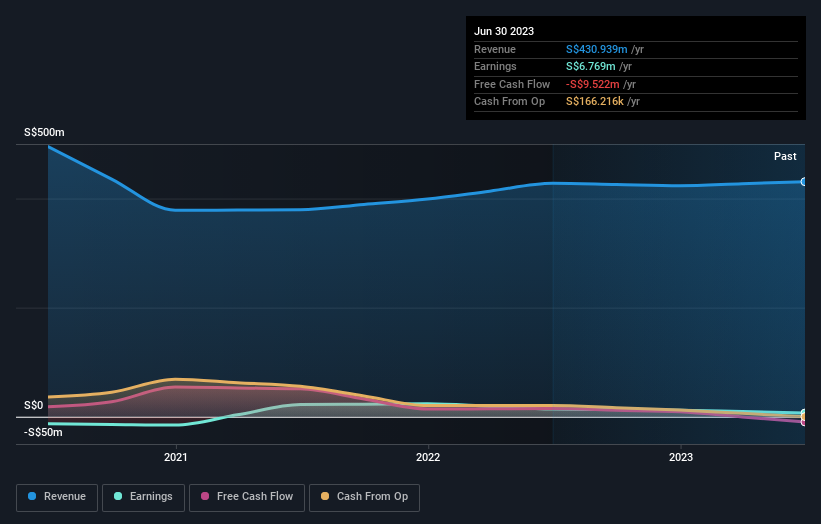With a 36% stake, PEC Ltd. (SGX:IX2) insiders have a lot riding on the company
Key Insights
Significant insider control over PEC implies vested interests in company growth
57% of the business is held by the top 3 shareholders
Using data from company's past performance alongside ownership research, one can better assess the future performance of a company
A look at the shareholders of PEC Ltd. (SGX:IX2) can tell us which group is most powerful. And the group that holds the biggest piece of the pie are individual insiders with 36% ownership. Put another way, the group faces the maximum upside potential (or downside risk).
With such a notable stake in the company, insiders would be highly incentivised to make value accretive decisions.
Let's delve deeper into each type of owner of PEC, beginning with the chart below.
See our latest analysis for PEC
What Does The Institutional Ownership Tell Us About PEC?
Institutions typically measure themselves against a benchmark when reporting to their own investors, so they often become more enthusiastic about a stock once it's included in a major index. We would expect most companies to have some institutions on the register, especially if they are growing.
Since institutions own only a small portion of PEC, many may not have spent much time considering the stock. But it's clear that some have; and they liked it enough to buy in. If the business gets stronger from here, we could see a situation where more institutions are keen to buy. We sometimes see a rising share price when a few big institutions want to buy a certain stock at the same time. The history of earnings and revenue, which you can see below, could be helpful in considering if more institutional investors will want the stock. Of course, there are plenty of other factors to consider, too.
PEC is not owned by hedge funds. Looking at our data, we can see that the largest shareholder is Tian San Company (Pte.) Limited with 34% of shares outstanding. For context, the second largest shareholder holds about 14% of the shares outstanding, followed by an ownership of 9.3% by the third-largest shareholder. Poh Thim Ko, who is the second-largest shareholder, also happens to hold the title of Top Key Executive. Furthermore, CEO Robert Dompeling is the owner of 0.7% of the company's shares.
After doing some more digging, we found that the top 3 shareholders collectively control more than half of the company's shares, implying that they have considerable power to influence the company's decisions.
While it makes sense to study institutional ownership data for a company, it also makes sense to study analyst sentiments to know which way the wind is blowing. As far as we can tell there isn't analyst coverage of the company, so it is probably flying under the radar.
Insider Ownership Of PEC
The definition of company insiders can be subjective and does vary between jurisdictions. Our data reflects individual insiders, capturing board members at the very least. Company management run the business, but the CEO will answer to the board, even if he or she is a member of it.
I generally consider insider ownership to be a good thing. However, on some occasions it makes it more difficult for other shareholders to hold the board accountable for decisions.
Our information suggests that insiders maintain a significant holding in PEC Ltd.. Insiders own S$48m worth of shares in the S$134m company. We would say this shows alignment with shareholders, but it is worth noting that the company is still quite small; some insiders may have founded the business. You can click here to see if those insiders have been buying or selling.
General Public Ownership
The general public, who are usually individual investors, hold a 26% stake in PEC. While this group can't necessarily call the shots, it can certainly have a real influence on how the company is run.
Private Company Ownership
Our data indicates that Private Companies hold 34%, of the company's shares. Private companies may be related parties. Sometimes insiders have an interest in a public company through a holding in a private company, rather than in their own capacity as an individual. While it's hard to draw any broad stroke conclusions, it is worth noting as an area for further research.
Next Steps:
While it is well worth considering the different groups that own a company, there are other factors that are even more important. Consider for instance, the ever-present spectre of investment risk. We've identified 2 warning signs with PEC , and understanding them should be part of your investment process.
Of course, you might find a fantastic investment by looking elsewhere. So take a peek at this free list of interesting companies.
NB: Figures in this article are calculated using data from the last twelve months, which refer to the 12-month period ending on the last date of the month the financial statement is dated. This may not be consistent with full year annual report figures.
Have feedback on this article? Concerned about the content? Get in touch with us directly. Alternatively, email editorial-team (at) simplywallst.com.
This article by Simply Wall St is general in nature. We provide commentary based on historical data and analyst forecasts only using an unbiased methodology and our articles are not intended to be financial advice. It does not constitute a recommendation to buy or sell any stock, and does not take account of your objectives, or your financial situation. We aim to bring you long-term focused analysis driven by fundamental data. Note that our analysis may not factor in the latest price-sensitive company announcements or qualitative material. Simply Wall St has no position in any stocks mentioned.

 Yahoo Finance
Yahoo Finance 
